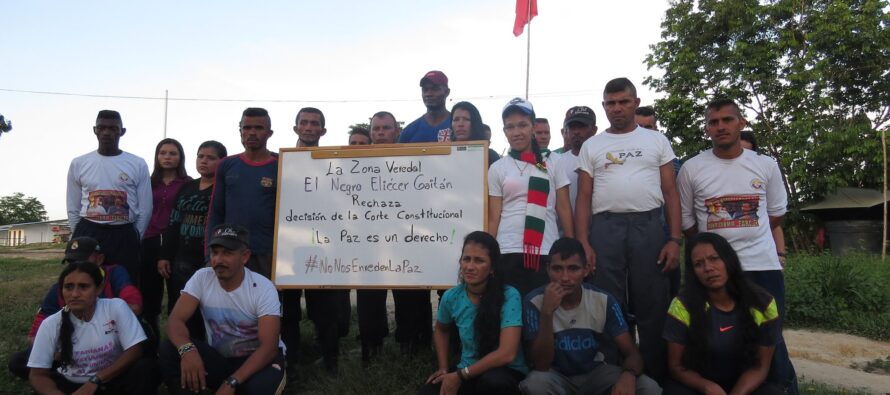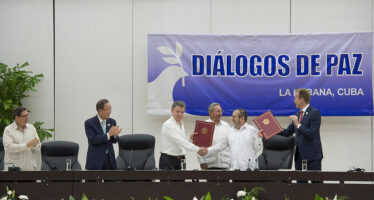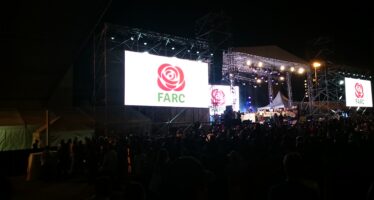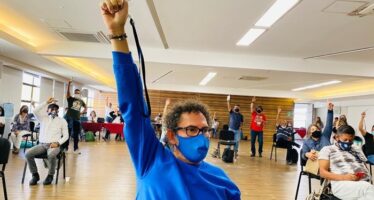Guerrillas and the Attorney General, the big difference

![]()
It is comforting to be able to feel the spirit of FARC guerrillas directly. As in the old days, people work constantly during the hours of the day. If the works advance in the Temporary Zone of Caño Indio and the other Zones, it can not be attributed to anything other than the tenacity and the sacrifice with which guerrillas work under the scorching sun.
Everyone is aware of the direction and follows it without any hesitation. They know that in less than fifteen days they will have abandoned their weapons, and that two months later they will be part of a new party or legal political movement, reincorporated into civil life and performing collective tasks with which they will earn their living.
They await the birth of ECOMUN, the great cooperative in which socio-economic projects will be contained, which will provide sufficient resources for the survival of the party and its members.
They are clear that they must work in a disciplined and cohesive way to make it possible. That things will not be easy, but that between all we will get ahead.
They have a political conviction and an enviable work capacity. They are young men and women, full of life and hopes, ready to build a new world with their hands. And to “infect” an entire people with their enthusiasm. It doesn’t deter them to know that the only weapon with which they will count on will be their word, nor that their only patrimony will be their will to work.
That is why the attitude of the Attorney General of the Nation, Néstor Humberto Martínez, is so offensive. No one better than the guerrillas know what it cost to build the FARC, with no other aid than that of their own effort. They lived on the run for more than half a century, with resources whose attainment cost the life, liberty or blood of many of them.
They always raised the flags of solidarity, justice and equality.
Everything they did was directed towards the construction of a new society, in which no one, the discriminated against, the poor like them, the despised and abandoned had at last a recognition and could fully enjoy the rights that their human condition deserves.
They needed to feed themselves, to dress themselves, to cure themselves from diseases, to heal their wounds, to equip themselves with the implements necessary for the errant life on the mountain, to acquire the goods they needed to be transported when necessary, to obtain weapons, ammunition, explosives and the other materials required to wage war.
Any remedy was always insufficient. Needs never ceased, but rather grew in number and quality over time. That is why it became necessary to build a war economy. Acquire cattle to feed thousands of fighters, beasts to move logistics, land and grass to support them, vehicles to move.
Under the permanent harassment of an enemy committed on snatching or destroying such property. An enemy that never ceased in his bloodthirsty pursuit. That imprisoned, murdered, displaced, dispossessed, and confiscated property of the peasant population whom he minimally suspected could provide assistance to the insurgency.
That celebrated leaving the guerrilla without food at the bottom of the jungle.
A peace agreement has now been signed. Everyone in the FARC know and applaud this, as do millions of Colombian men and women who value in all its significance the end of the armed conflict. After half a century of lead and entire decades of frustrated dialogues, some formulas were agreed that will allow a different future for this wounded homeland.
Among them several are contemplated that offend Martínez Neira in the most intimate. One is the creation of the Special Jurisdiction for Peace, or JEP, another is the creation of a special investigative unit to fight and for the persecution of paramilitaries, and another is the inventory and delivery of all the assets that constituted the war economy of the FARC.
The former he does not like because with it the Prosecutor’s Office will exhaust its capacity to prosecute the FARC for the events committed in the course of the conflict. The second he does not like because the special unit will operate autonomously in the investigations into the paramilitary activity during and after the conflict. The third one he doesn’t like because it does not share the fate of FARC assets.
It has announced that he will deliver 50,000 criminal investigations conducted by the Prosecutor’s Office against the FARC. But he wants to continue taking care of others, in open contradiction with the granted amnesty and pardon. His obsession with the FARC contrasts with the very low percentage of investigations carried out against state and paramilitary agents, he clearly doesn’t care about.
This demonstrates his total disinterest in establishing the truth about the conflict. This is reinforced by his resistance to the special investigation unit. He does not accept that an entity beyond his control has the ability to advance the cases which the prosecution did not carry out during decades of impunity. He can’t accept that this unit will uncover what the State always kept hidden.
His past dedicated to defend interests of big businessmen is well known. Likewise we can see the pain that causes him the idea that some or many of them could be affected. In the same way he raves because the assets of the FARC are going to be destined for the reparation of the victims. He assures, without proving it, that it is billions we are talking about. And he maintains that fiscal sovereignty can not be restrained.
In his opinion, the FARC’s splendid fortune must enter into the coffers of the State so that the State could freely dispose of it. Its final destination to the victims is questioned as well as the responsible for handling this money. He does not hide how much he would like the imaginary flow to move to the management of private banking and entrepreneurs he has always defended.
If the price of a rifle was to be set at twenty million pesos, seven thousand of them would add up to one hundred and forty billion.
Weapons in the caches, explosive material, mortars, machine guns and so on will add up to surprising figures. Movable and immovable property inventoried and delivered will surely increase the final sum.
Without exaggerations.
Meanwhile guerrilla men and women retain the illusion of building a legal heritage with their bare hands, with their proven ability to work. They claim fairly that they are to be awarded land to implement their productive projects, which could provide them with basic resources to start them.
They play honestly and don’t give up.
Learn, Mr. Prosecutor, and respect.
Caño Indio, 6 June 2017
Related Articles
Colombia: Cese al fuego y de hostilidades bilateral y definitivo
![]()
A partir de hoy las FARC-EP y las fuerzas armadas colombianas estaran en cese el fuego bilateral y definitivo.
De las FARC nació el Partido Político de la Alternativa en Colombia
![]()
Finalmente la nueva fuerza política que ya ha nacido de las antiguas FARC-EP, llevara por nombre Fuerza Alternativa Revolucionaria del Comun
¿Qué pasó en la Asamblea del Partido Farc en la que nació Comunes?
![]()
Crónica de Gabriel Ángel, quien asistió al encuentro que reunió 258 delegados y que operó en simultánea desde el Hotel




